Rework Journeys
A deep-dive to Real estate CRM for brokers, agents and property businesses
As a broker, agency owner, or property business leader, you know that real estate success depends on relationships and systematic follow-up. And there comes a point when your business has outgrown spreadsheets and WhatsApp groups.
That’s when you need a CRM, preferably tailored to your real estate needs.
This guide covers everything you need to know about real estate CRM - from understanding how the industry actually works to choosing the right platform for your specific business model.
Understanding the real estate business and sales funnel
Key business models
There are several different models that often overlap. Understanding where your company fits helps determine what kind of CRM setup you actually need.
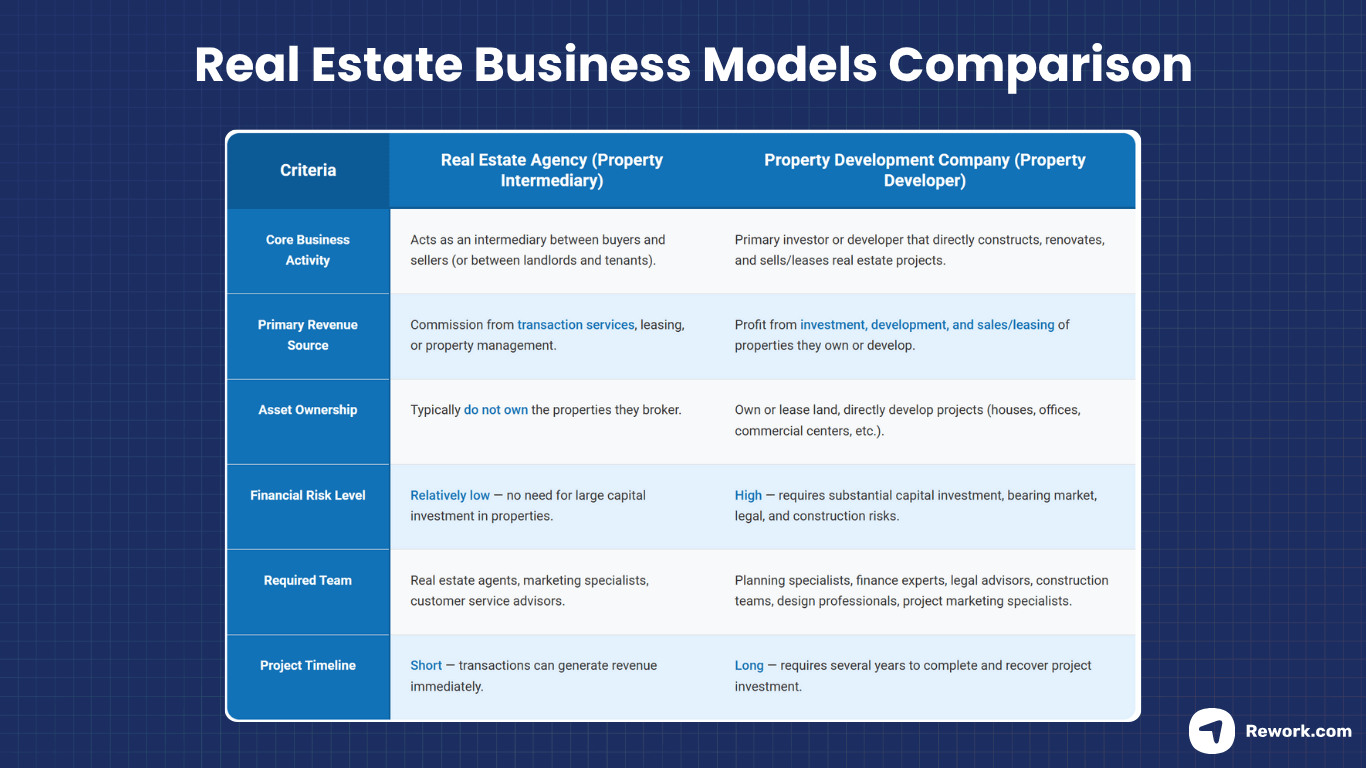
Property development companies are the "manufacturers" of the industry that invest in, plan, build, and sell real estate projects. They create new properties - apartments, office buildings, industrial parks, residential developments.
Most developers handle sales in one of two ways: they either build internal sales teams to sell directly to buyers, or they outsource the selling process to real estate agencies. Either way, they need systems to track leads, manage sales processes, and coordinate with multiple stakeholders during the development and sales phases.
Real estate agencies and brokerages work as intermediaries. They don't own the properties they sell - they help connect buyers with sellers (or tenants with landlords). Their business model revolves around commissions from successful transactions.
These agencies typically work with a mix of employed agents and freelance contractors. The freelancers often run their own lead generation (spending their own money on Facebook ads, for example) while employed agents might work leads provided by the company.
This creates interesting data ownership challenges. When agents spend their own money generating leads, they often view that contact information as personal assets rather than company data.
Supporting models also matter for understanding the full ecosystem:
- Construction companies handle the building process
- Property management firms run day-to-day operations for buildings and developments
- Investment firms buy, hold, and sell properties as financial assets
For CRM purposes, we're focusing on the first two models - businesses that have sales teams actually selling real estate to end customers.
Sales funnel and activities
Real estate sales cycles are longer and more complex than most industries. A typical pipeline looks like this:
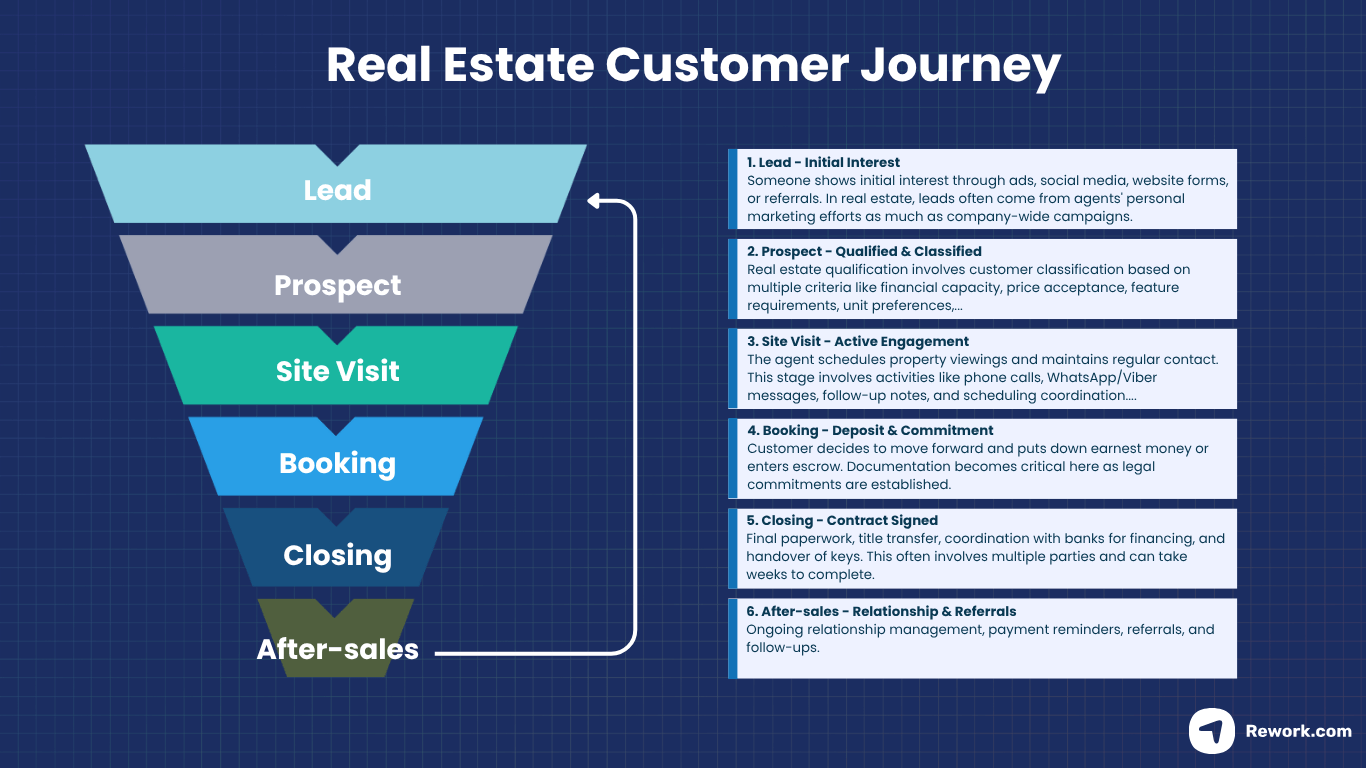
Lead: Someone shows initial interest through ads, social media, website forms, or referrals. In real estate, leads often come from agents' personal marketing efforts as much as company-wide campaigns.
Prospect/Qualified Lead: This is where real estate gets complex. Instead of one "qualified" stage, most companies break this down by customer classification.
This is one example of the classification system:
- Type A: Meets all criteria (financial capacity, price acceptance, feature requirements, unit preferences)
- Type B: Meets 3 out of 4 criteria
- Type C: Meets 2 out of 4 criteria
- Type D: Meets 1 criterion
- Inactive: Doesn't meet basic criteria
Site Visit/Active: The agent schedules property viewings and maintains regular contact. This stage involves the most day-to-day activity - phone calls, WhatsApp/Viber messages, follow-up notes, scheduling coordination.
Booking/Deposit: Customer decides to move forward and puts down earnest money or enters escrow. Documentation becomes critical here.
Closing/Contract Signed: Final paperwork, title transfer, coordination with banks for financing, handover of keys. This often involves multiple parties and can take weeks to complete.
After-sales/Referral: Ongoing relationship management, payment reminders for installment purchases, referral requests, birthday wishes, housewarming follow-ups.
The key difference from other sales processes is that real estate deals can stay in "active" stages for months. An agent might show 15 different properties to the same client over six months before they find something they want to buy. This makes long-term relationship tracking and activity management absolutely critical.
At each stage, agents need to log specific types of information:
- Financial qualification details that help with future property matching
- Preference tracking (location, size, price range, specific features)
- Interaction history that helps other team members pick up relationships
- Document management for contracts, approvals, and legal requirements
- Listing coordination to match inventory with customer needs
The complexity comes from managing all these moving pieces while maintaining personal relationships that drive referrals - which are often the highest-quality leads in real estate.
This is exactly why real estate businesses need specialized systems to handle operations that go far beyond basic contact management.
What is a real estate CRM & Key features
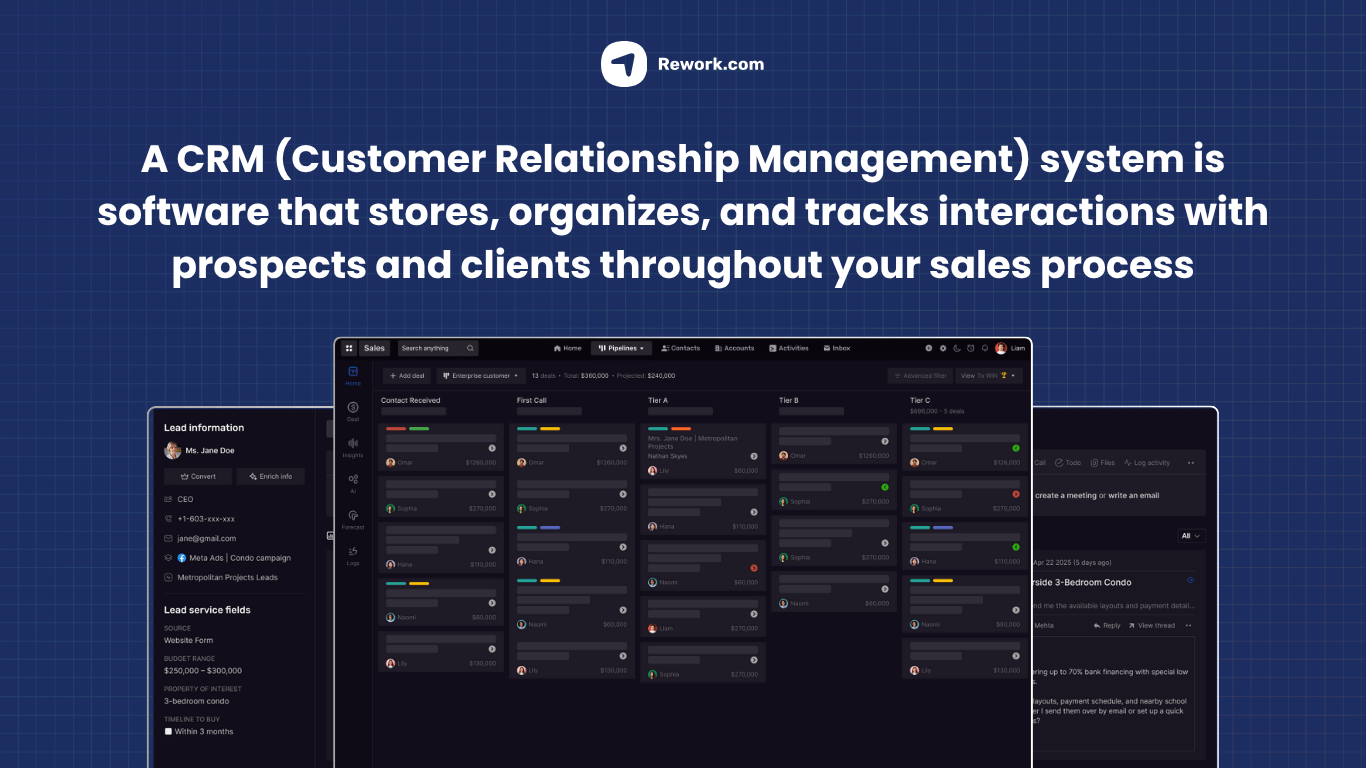
A CRM (Customer Relationship Management) system is software that stores, organizes, and tracks interactions with prospects and clients throughout your sales process. At its core, CRM does three things: it captures information, organizes that information in useful ways, and automates repetitive tasks based on that information.
Without proper systems, you're losing money in ways you can't even measure. Lead sources become black holes. Follow-up becomes hit-or-miss. Your valuable data scatter across personal systems, and revenue performance become a guesswork.
But not all CRMs work the same way. Real Estate CRM is specifically designed to handle the unique data structures and workflows that property businesses require.
The core features a real estate CRM should have:
Automatic lead capturing. The system connects directly to your marketing channels - Facebook ads, Google campaigns, website forms, landing pages - and automatically creates contact records when new prospects express interest. There should be no more manual data entry or lead missing because someone forgot to update the spreadsheet. When a prospect fills out a property inquiry form at 11 PM, they're instantly in your system with proper source attribution and assignment rules.
Activity and interaction tracking. Instead of switching between WhatsApp, email, phone logs, and calendar apps, the system centralizes communication history and connects with external tools agents use daily. Every phone call, text message, email, site visit, and follow-up gets automatically logged with timestamps, notes, and outcomes. This creates a complete communication timeline that any team member can review to understand the relationship history and pick up conversations without missing context.
Automatic follow-up sequences. Based on prospect actions or stage changes, the system generates follow-up tasks with suggested timing and content. When someone requests property information, it creates a call task within 2 hours. When they visit a site, it schedules follow-up reminders for the next day. When they go quiet for two weeks, it triggers re-engagement sequences. This ensures consistent professional follow-up without relying on agent memory or personal organization systems.
Pipeline and sales analytics provides visibility into what's actually happening with your business. Not just "how many leads did we get" but "which lead sources produce buyers who actually close" and "which agents are best at moving prospects from site visits to deposits."
The key difference from other industries is that real estate CRMs need to handle dual pipelines. Many agencies track both buyer pipelines (people looking to purchase) and seller pipelines (property owners looking to list). These often intersect - your system needs to automatically match buyer preferences with available inventory.
Centralized workflow and data relationships. Real estate transactions are often lengthy and involve multiple parties. The CRM should reflect these multi-layered relationships: from contacts to properties to agents for reporting across multiple data dimensions. More critically, the system should be able to manage the complex handoff between sales transactions and legal processes, while centralizing the various documents that the transaction may require.
Mobile app version. Since agents spend most of their time out of the office - showing properties, meeting clients, attending networking events - mobile access isn't optional. The mobile app should provide full CRM functionality, not just contact viewing. Agents need to update client information during site visits, log interaction notes immediately after phone calls, check property availability while standing in front of competing listings, and receive push notifications for urgent follow-ups.
What can make a CRM solution different for a real estate business
Not all CRM platforms understand real estate. Most are built for simple B2B sales cycles and break down when you try to handle the complexity of property transactions, long-term relationship management, and multi-party coordination.
Here's what actually matters when you're evaluating CRM solutions for your real estate business.
Centralized platform architecture
Real estate teams use WhatsApp for quick client communication, Google Calendar for site visit scheduling, DocuSign for contract signatures, and various marketing platforms for lead generation. Your CRM needs to connect with these tools natively, not through clunky workarounds.
A centralized platform architecture means everything connects - not just communication channels, but operational tools across your entire business. Your CRM should integrate with marketing platforms for lead capture, communication tools like WhatsApp for client interaction, calendar systems for site visit scheduling, and most critically, workflow management for after-sales processes. When a deal moves from sales to contract execution, all client information, property details, and timeline requirements transfer seamlessly to legal teams without information loss in email chains.
Scalability with flexibility
Real estate businesses grow in unpredictable ways. You might add 10 agents in three months when a good project launches, then stay stable for a year before expanding into commercial properties or property management services.
Your CRM needs to handle this growth without breaking existing workflows or requiring expensive reimplementation projects.
The bigger issue is permission management. Real estate agencies need complex permission structures - some agents can see all listings, others only see their assigned properties. Some can access financial qualification data, others can't.
Sales processes also vary between different property types. Selling new development units involves different stages than reselling existing homes. Commercial real estate follows different timelines than residential transactions.
Your CRM should allow these permissions or process customization without requiring technical expertise. This requires a high flexibility in the data structure.
Dedicated consultancy and implementation support
Real estate operations are too complex for generic implementation approaches. So if the software vendor sells you a platform, provides basic training, and then expects your team to figure out the complex process mapping and workflow design, you are bound to get in trouble.
Instead, look for providers with these requirements:
Operational mapping expertise:
The best CRM implementations start with understanding your current processes before building new ones. How do leads currently flow from marketing to agents? What information gets collected during qualification calls? How do listings get updated and distributed? What documents are required at each transaction stage?
A dedicated implementation consultant should map these processes, identify bottlenecks, and design improved workflows that fit your business model rather than forcing you to adapt to the software.
It’s best to look for partners who have worked extensively with real estate businesses and understand industry-specific challenges like lead ownership disputes, long sales cycles, and referral relationship management.
Change management and training:
Real estate agents are often skeptical of new technology, especially if they've been successful with their current methods.
Effective training goes beyond software features to help end users get familiar with the new digitized sales processes. They should accompany you in helping the end users understand the benefits of the system, which may involve mapping a suitable rollout for the organization.
Ongoing optimization:
Real estate markets change, and your processes need to evolve accordingly. New marketing channels and new sales groups require different lead distribution approaches. You’ll need new types of pipelines or account management.
Your CRM partner should provide ongoing consultation to help optimize processes based on performance data and market changes, not just technical support when things break.
The difference between a successful CRM implementation and an expensive failure often comes down to the quality of implementation support rather than the features of the software itself.
Rework's unified operations platform delivers exactly these differentiators - centralized architecture that connects all your operational tools, scalable flexibility for real estate's unpredictable growth, and dedicated industry-specific consultancy. But let's move beyond features to show you how this works in practice for real estate businesses.
How Rework transforms real estate operations: Practical use cases
Here's how leading property businesses are using Rework to solve the operational challenges that hold most real estate companies back from scaling effectively.
1. Automated lead capture and distribution
Rework connects directly with all major lead sources - Facebook Ads, Google Ads, landing pages, or manual imports - and consolidates them into one Lead Management pool.
Using the built-in Lead Routers, leads are automatically assigned to the right sales agent or team based on region, project, or campaign source, or whatever condition that you configure. New leads are followed up on instantly, providing managers with transparent visibility into response time and conversion rates.
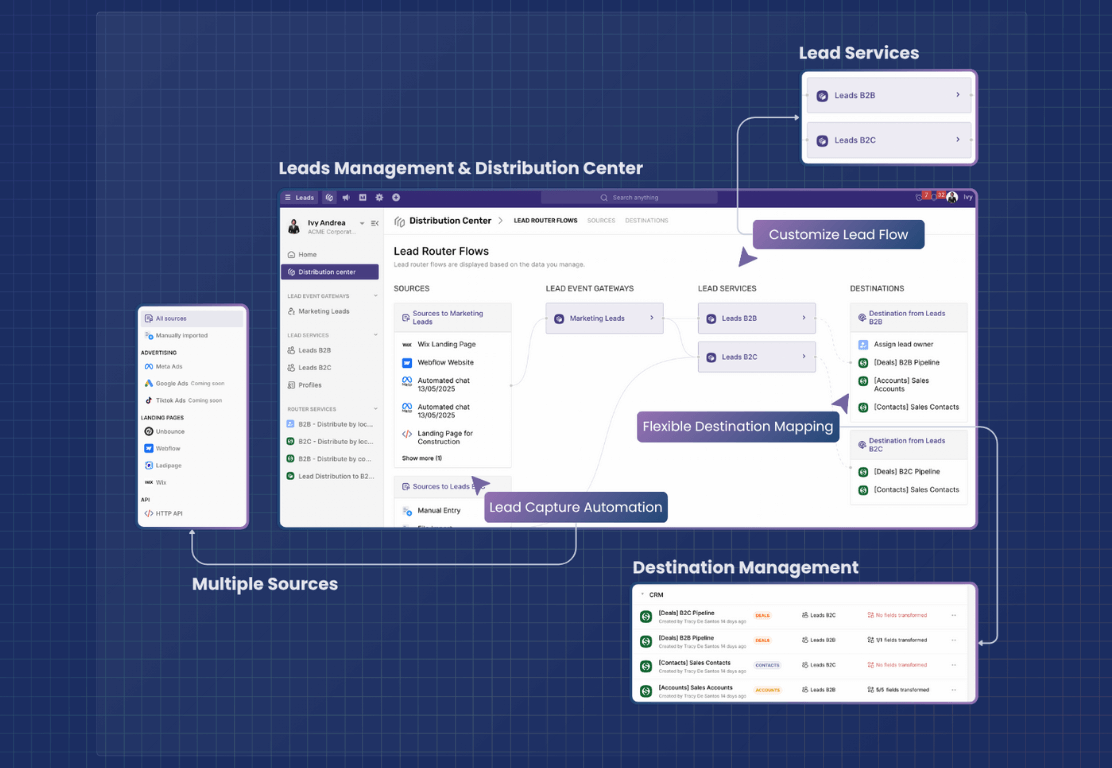
2. Scalable sales playbooks with Automation and Agentflows
Rework helps property agents follow a consistent and professional sales process through Automation Playbooks.
With every lead enrolled, the system automatically generates follow-up tasks or email templates to guide agents step-by-step - call on Day 1, send a personalized message on Day 2, email on Day 3, and so on.
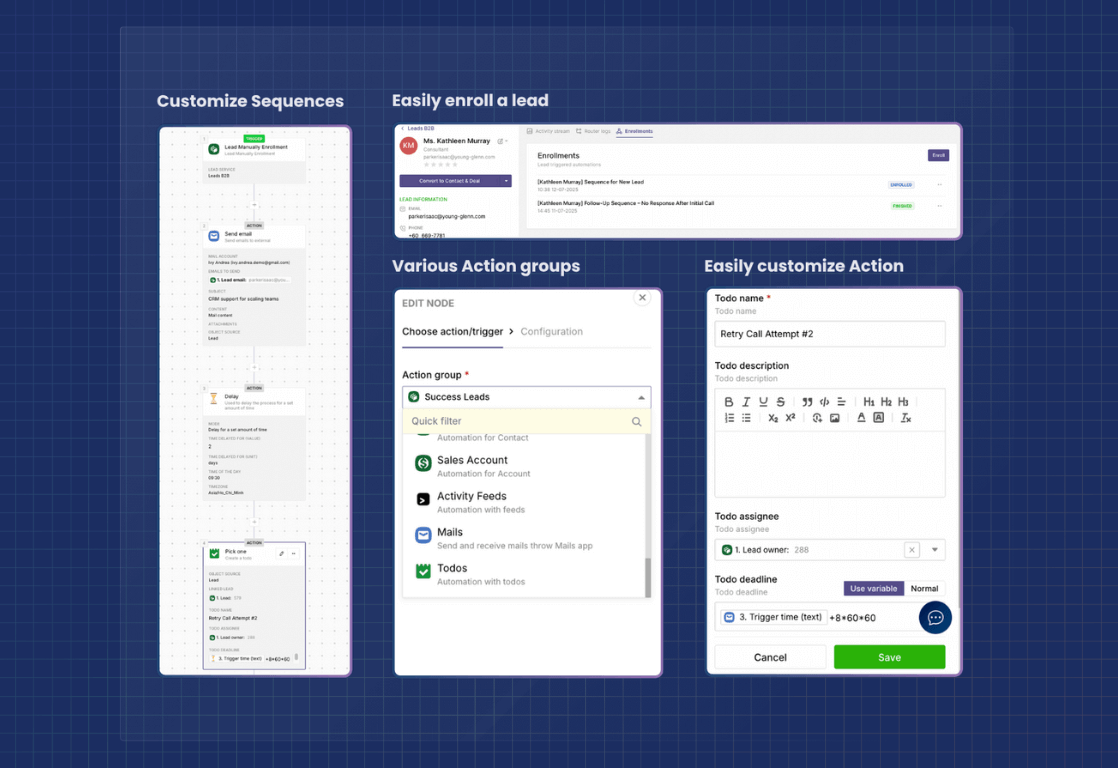
Rework’s AI Agentflows is even more powerful. It can empower sales teams to work smarter by transforming their daily workflows into intelligent, AI-driven processes. Using simple natural language or a visual builder, sales managers can create customized agents such as Contact Research, Deal Review, or Contract Risk Agents that automate critical parts of the sales cycle without requiring any coding skills.
Once triggered, these agents understand the company’s sales context, helping reps prepare for meetings, evaluate deal health, or identify contract risks with remarkable accuracy. Teams can share and refine these agents across the organization, ensuring consistent performance and faster adoption of best practices.
With Automation and Agentflows, sales operations become more scalable, data-driven, and efficient, allowing reps to focus on closing deals rather than managing tasks.
3. Real-time performance and campaign reports
Sales managers no longer need to chase updates or merge spreadsheets. Rework’s AI-powered reporting automatically tracks campaign ROI, deal progress, and sales performance in real time.
Reports can be visualized in multiple chart formats, customized per project, or generated automatically by AI, giving leaders instant insight into what’s working and where follow-ups are needed.
4. Centralized listing and property management
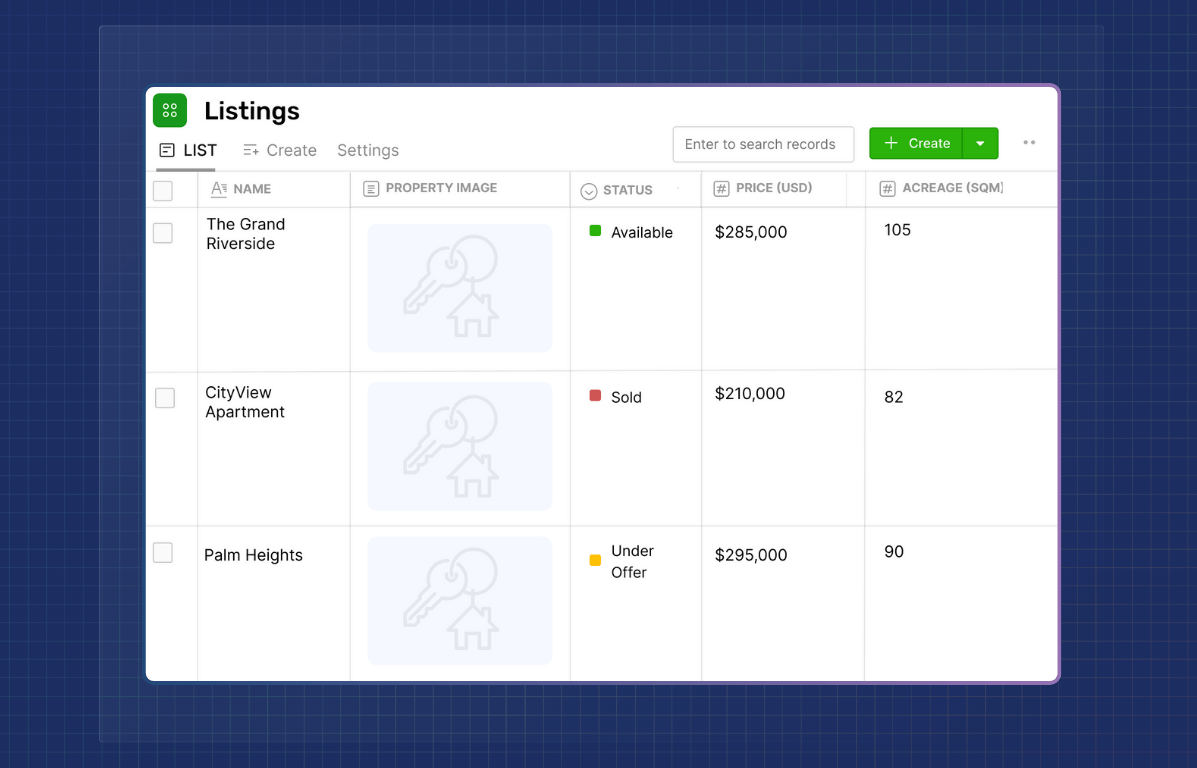
A great agent relies on an up-to-date, searchable property database. With Rework’s Datasets, your team can manage listings like assets, complete with location, area, pricing, images of the property, and availability fields in a centralized place.
This eliminates fragmented Excel sheets and ensures the entire sales team works with the latest, verified inventory.
6. Workflow integration
Rework bridges CRM and operations with seamless data transfer into workflow systems for post-sale processes like Title Transfer, Payment Tracking, and Customer Handover.
For example, when deals move to contract stage, the system automatically creates document checklists, deadline reminders, and approval workflows.
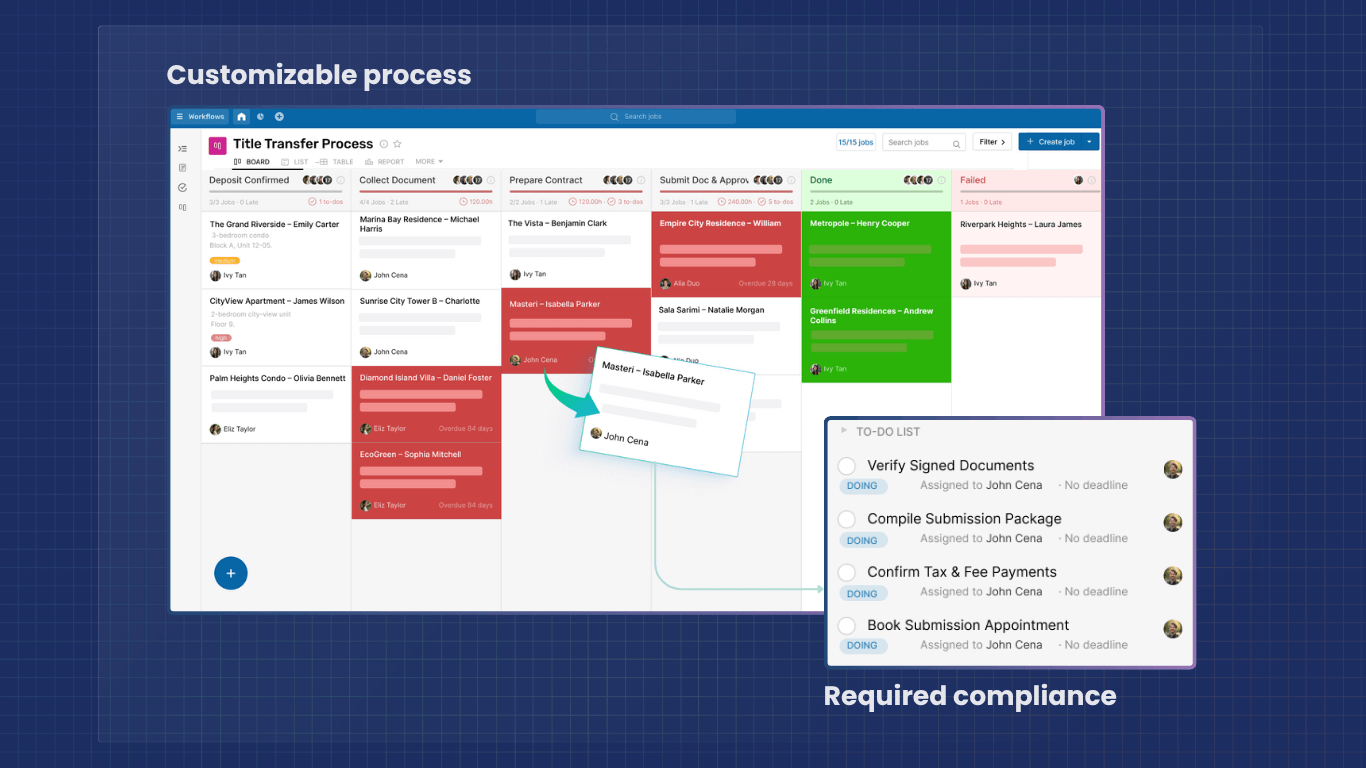
All client information, property details, financing documents, and timeline requirements transfer seamlessly to legal teams. Status updates flow back to sales teams so they can keep clients informed about title transfer progress without constantly calling legal coordinators.
No information is lost between sales and operations teams, and the team is provided with full visibility until ownership transfer is completed.
The bottom line
As your real estate business grows, the question isn't whether you need a CRM. It's whether you can afford to keep operating without one while your competitors gain systematic advantages in lead management, relationship tracking, and performance optimization.
Rework's implementation process starts with mapping your current operations - lead flow from marketing to agents, information collection during client interactions, listing management and updates, document requirements for different transaction types.
Want to see how this applies to your specific business model?
Let's schedule a consultation to map your current processes and design a system that amplifies your team's strengths.

Camellia
Content Strategist
On this page
- Understanding the real estate business and sales funnel
- Key business models
- Sales funnel and activities
- What is a real estate CRM & Key features
- The core features a real estate CRM should have:
- What can make a CRM solution different for a real estate business
- Centralized platform architecture
- Scalability with flexibility
- Dedicated consultancy and implementation support
- How Rework transforms real estate operations: Practical use cases
- 1. Automated lead capture and distribution
- 2. Scalable sales playbooks with Automation and Agentflows
- 3. Real-time performance and campaign reports
- 4. Centralized listing and property management
- 6. Workflow integration
- The bottom line